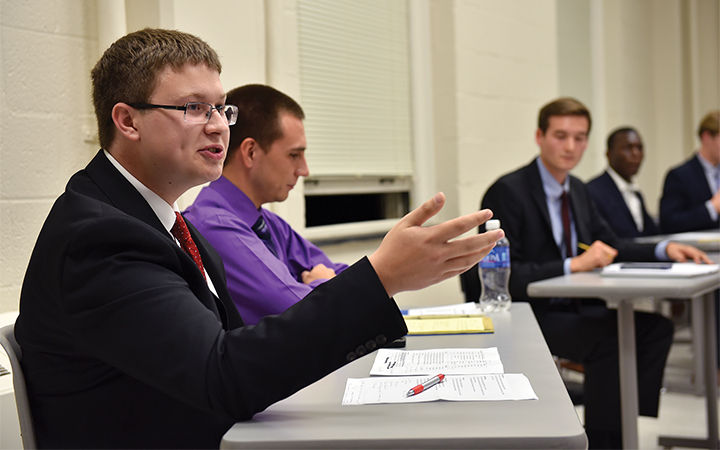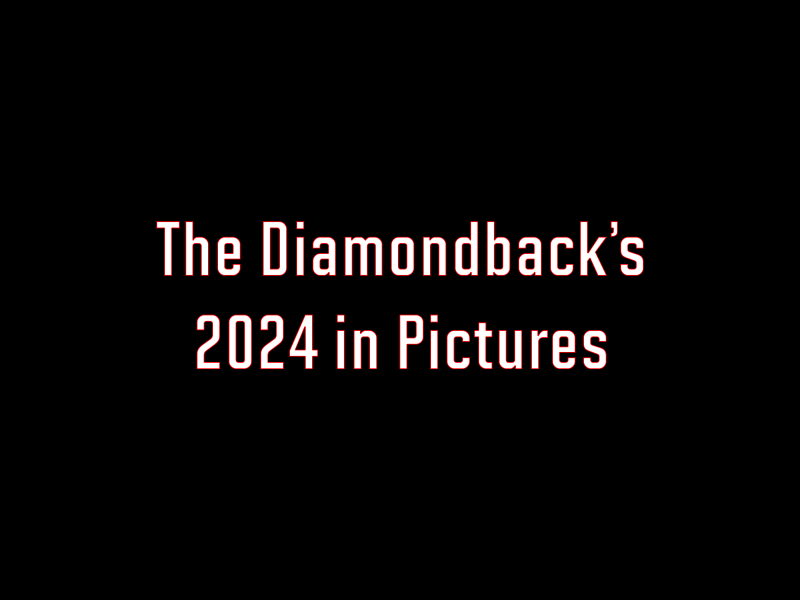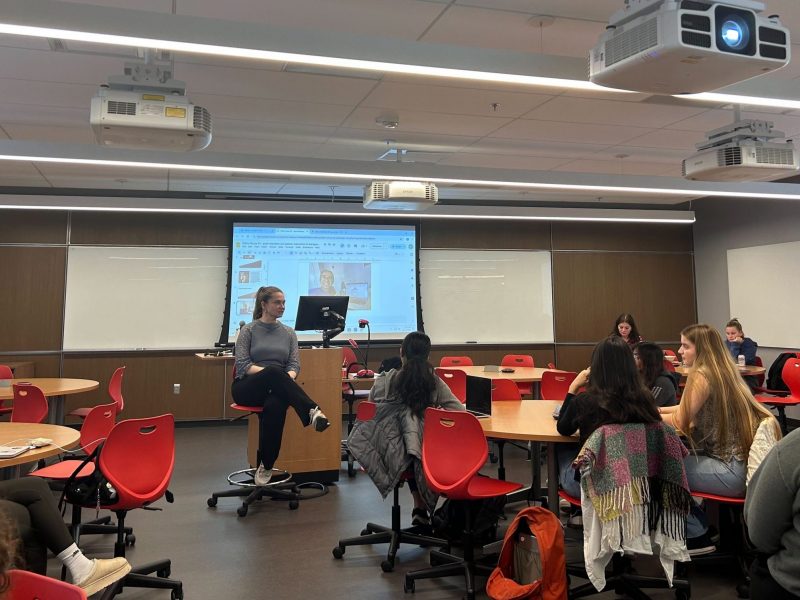
Jacob Veitch speaks to a packed room at the Maryland Discourse Republican debate where students from two Republican campus groups debated issues facing the Republican Party on Oct. 12, 2015 in Tydings Hall.
Members of the University of Maryland College Republicans and the University of Maryland Progressive Republican Club debated Monday about what the Republican Party might look like in 20 years as younger, more socially liberal voters become politically active.
About 75 students attended the debate in a full Tydings Hall classroom. UMD College Republicans president Breyer Hillegas and public relations officer Jacob Veitch debated the Progressive Republican Club’s co-presidents Bobby Lindsey II and Nolan Quinn.
The Progressive Republican Club formed in October 2014 in response to “a stark move to the right” within the Republican Party, Lindsey said.
Lindsey said he believes the party is currently too unwilling to compromise and must reconsider its stances on abortion, same-sex marriage, immigration and the environment if it hopes to stay competitive in national elections.
The party must also stop catering to the far right faction and be more open to minority concerns and women’s issues, he said.
“If there will be a Republican Party 20 years from now, it must look like the people that are in this room: people from all different walks of life, of different colors and faiths, from both genders and regardless of your sexual orientation,” Lindsey, a senior government and politics major said. “And as such the GOP can no longer afford to accommodate those that seek to exclude, to marginalize and to regress this country.”
Hillegas,of UMD College Republicans,said he is confident the party will change with voters and that his club is largely progressive on many issues.
He surveyed members of his club and found that only 18 percent favor traditional marriage, 78 percent think abortion should be allowed in at least some circumstances and 44 percent think global warming is a large concern that needs to be addressed.
“I think that the Republican Party is going to get extremely more progressive. I think that’s a good thing, some people in my club might not,” the senior biology major said. “We are not the same as the Republican Party in general. We’re younger, we’re different, you know, we represent what the future of the Republican Party looks like.”
While the debaters personally agreed on many social policy issues, Lindsey and Quinn said the UMD College Republicans need to take a stronger stance on these issues as a group. Being exclusive is better than “accommodating crazies,” Lindsey said.
Quinn, a sophomore government and politics major said the far right has recently “held the rest of the Republican Party hostage.”
While some far-right Republicans may disagree with the majority opinion of the club, Hillegas said he wants to foster an open dialogue and face the divisions within the party directly.
“Our club believes in discussion and not division,” said Veitch,a sophomore government and politics major. “It’s important that we talk about these things because maybe one day someone will change their mind.”
Freshman government and politics major Hannah Devoe said it was interesting how much the two sides agreed. While she said she is undecided about where she stands politically, she sided more with the Progressive Republican Club during the debate.
“I liked their answers. They were more responsive, they were more inclusive, they were more informed,” she said. “Also the rights for women and rights for races and all of that, that they covered and that they really clearly stood by was important to me.”
Sophomore economics major Tommy Brophy said he heard about the event on Facebook and decided to attend because he is a registered Republican.
“It got feisty at some points and I think that some of the personal attacks sort of took away from what they actually had to say,” Brophy said. “Both groups had some very good ideas… It’s tough to say if I stood with one more than the other.”
Maryland Discourse,a new group that formed this fall to create a more politically aware and engaged campus,facilitated the event. The group aims to hold events throughout the year that allow students to hear different viewpoints and learn about political issues.
While many people believe college students are apathetic about political issues, Maryland Discourse CEO Christian Knapp,a sophomore economics and government and politics major,said students do have opinions and will take a stance when they have the necessary information.
“This is just a way of provoking those responses and getting more people to realize that, you know they do care about political issues,” Knapp said. “This is a way for them to get more engaged.”
CORRECTION: The photo caption in a previous version of this story misspelled Jacob Veitch’s name. The article has been updated.



